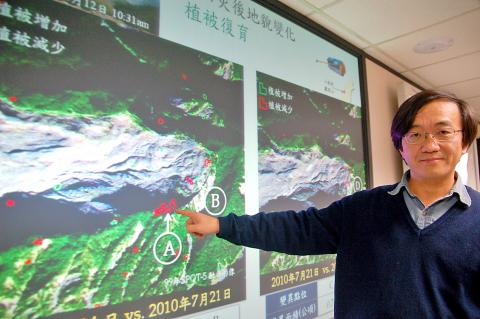Remote sensing scientist Chen Kun-shan (陳錕山) was not involved in any sensitive research projects in Taiwan before he defected to China, the Ministry of National Defense said yesterday.
Chen, head of the Center for Space and Remote Sensing Research at National Central University (NCU) since 2001, disappeared in September last year. He is now working at China’s State Key Laboratory of Remote Sensing Science under Beijing’s high-profile “Thousand Talents Program,” which seeks to attract overseas scientists.
In a front-page story yesterday, the Chinese-language Liberty Times (the Taipei Times’ sister newspaper) cited an intelligence source as saying that Chen’s defection posed a “serious threat” to Taiwan’s national security.

Photo: Hsieh Wen-hua, Taipei Times
As head of the center, Chen had access to satellite images covering Taiwan and China’s military deployments, and was in a category of government employees with access to state secrets and restricted from visiting China, the report said.
However, Ministry of Defense spokesman Major General David Lo (羅紹和) yesterday said that Chen had undertaken research projects commissioned by the Chung-Shan Institute of Science and Technology (CSIST, 中山科學研究院) and the ministry’s Communications Development Office, all of which were academic in nature and unrelated to key military technologies.
Meanwhile, Ministry of Education Secretary-General Wang Tsuo-tai (王作台) said that Chen was suspended by the university in November last year, two months after he went absent without leave.
Wang said the university learned through Chinese media reports in March that Chen had been hired to work at State Key Laboratory of Remote Sensing Science.
The reports were later verified with Beijing through the Mainland Affairs Council, he added.
The university confirmed yesterday that it had decided on April 7 to dismiss Chen and had submitted his case to the Ministry of Education for final approval.
Kainan University vice president David Huang (黃適卓) yesterday lambasted Minister of Education Chiang Wei-ling (蔣偉寧), accusing the education ministry of failing to implement proper preventive mechanisms on cross-strait academic interaction.
Huang said Chiang should take full responsibility for what he described as a “national security fiasco” and step down, as Chuang had been instrumental in promoting the disloyal Chen to his position at the NCU center.
Huang said China has long coveted Taiwanese technology and has been using the guise of academic interaction to implement its “united front” rhetoric.
Huang said that China is still absorbing what it can of Taiwan’s academic research, especially in nanotechnology, agricultural sciences and husbandry, and information technology, in which Taiwan has made significant advances.
Cooperation between academia and the military has a long history, and many military projects have sought the participation of educators, Huang said, adding that these professors have been targeted by Chinese intelligence for contact.
Before both sides of the Taiwan Strait agreed to academic exchanges, contacting Taiwanese academics had been the job of Taiwanese businesspeople in China, Huang said, adding that after academic exchanges were approved, China has used that channel to contact educators directly.

CHAOS: Iranians took to the streets playing celebratory music after reports of Khamenei’s death on Saturday, while mourners also gathered in Tehran yesterday Iranian Supreme Leader Ayatollah Ali Khamenei was killed in a major attack on Iran launched by Israel and the US, throwing the future of the Islamic republic into doubt and raising the risk of regional instability. Iranian state television and the state-run IRNA news agency announced the 86-year-old’s death early yesterday. US President Donald Trump said it gave Iranians their “greatest chance” to “take back” their country. The announcements came after a joint US and Israeli aerial bombardment that targeted Iranian military and governmental sites. Trump said the “heavy and pinpoint bombing” would continue through the week or as long

TRUST: The KMT said it respected the US’ timing and considerations, and hoped it would continue to honor its commitments to helping Taiwan bolster its defenses and deterrence US President Donald Trump is delaying a multibillion-dollar arms sale to Taiwan to ensure his visit to Beijing is successful, a New York Times report said. The weapons sales package has stalled in the US Department of State, the report said, citing US officials it did not identify. The White House has told agencies not to push forward ahead of Trump’s meeting with Chinese President Xi Jinping (習近平), it said. The two last month held a phone call to discuss trade and geopolitical flashpoints ahead of the summit. Xi raised the Taiwan issue and urged the US to handle arms sales to

State-run CPC Corp, Taiwan (CPC, 台灣中油) yesterday said that it had confirmed on Saturday night with its liquefied natural gas (LNG) and crude oil suppliers that shipments are proceeding as scheduled and that domestic supplies remain unaffected. The CPC yesterday announced the gasoline and diesel prices will rise by NT$0.2 and NT$0.4 per liter, respectively, starting Monday, citing Middle East tensions and blizzards in the eastern United States. CPC also iterated it has been reducing the proportion of crude oil imports from the Middle East and diversifying its supply sources in the past few years in response to geopolitical risks, expanding

Pro-democracy media tycoon Jimmy Lai’s (黎智英) fraud conviction and prison sentence were yesterday overturned by a Hong Kong court, in a surprise legal decision that comes soon after Lai was jailed for 20 years on a separate national security charge. Judges Jeremy Poon (潘兆初), Anthea Pang (彭寶琴) and Derek Pang (彭偉昌) said in the judgement that they allowed the appeal from Lai, and another defendant in the case, to proceed, as a lower court judge had “erred.” “The Court of Appeal gave them leave to appeal against their conviction, allowed their appeals, quashed the convictions and set aside the sentences,” the judges